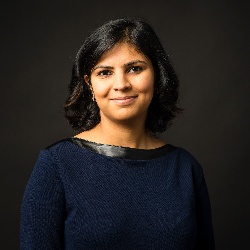 Definite diagnosis of cancer presence or recurrence is currently only possible via invasive biopsy or surgical intervention. Unfortunately, invasive biopsy, (a) in many cases is unnecessary due to absence of the disease, (b) have sampling errors depending on where the tissue sample is acquired from, and (c) could have irreparable and life-threatening side effects including mortality. Recently, artificial intelligence and radiomics have shown tremendous promise in leveraging imaging to non-invasively capture the landscape of tissue heterogeneity, previously not feasible by visual inspection. Similarly, one would leverage -omics and pathology information in conjunction with routine imaging to establish cross-scale associations towards designing more optimized personalized treatment options for cancer treatment. In this talk, I will focus on my lab’s recent efforts in developing radiomic (extracting computerized sub-visual features from radiologic imaging), radio-genomic (identifying radiologic features associated with molecular phenotypes), and radio-pathomic (radiologic features associated with pathologic phenotypes) techniques to capture insights into the underlying tumor biology as observed on non-invasive routine imaging. I will focus on clinical applications of this work for predicting disease outcome, recurrence, progression and response to therapy specifically in the context of brain tumors. I will also discuss our current efforts in developing new radiomic features for post-treatment evaluation and predicting response to chemo-radiation treatment. I will conclude with a discussion on our recent findings in AI + experts, in the context of a clinically challenging problem of distinguishing benign radiation effects from tumor recurrence on routine MRI scans. Session details...
|
BIO:
Dr. Pallavi Tiwari is an assistant professor of Biomedical Engineering and the director of Brain Image Computing laboratory at Case Western Reserve University. She is also an associate member of the Case Comprehensive Cancer Center. Dr. Tiwari got her undergraduate degree in Biomedical Engineering in 2006, and her Master's in Biomedical Engineering in 2008. She finished her Ph.D. from Rutgers University in 2012, and moved to Case Western Reserve as an assistant research professor. In 2016, she started the Brain Image Computing lab as a tenure-track assistant professor at Case Western. Her research interests lie in pattern recognition, data mining, and image analysis for automated computerized diagnostic, prognostic, and treatment evaluation solutions using radiologic imaging. In 2015, Dr. Tiwari was named by the government of India as one of 100 women achievers for making a positive impact in the field of science and innovation. She has been a recipient of many research-related awards including Case-Coulter Translational award, Department of Defense Career Development Award, and Dana Foundation Neuroimaging Award; and is currently leading a team of researchers on multiple projects in prognosis and treatment evaluation in brain tumors and neurological disorders.
SUMMARY:
Topic: Radiomics, Radiogenomics, and Radiopathomics for Predicting and Evaluating Response to Cancer Treatment
Speaker: Pallavi Tiwari, Ph.D., Case Western University
Date: Wednesday, October 24, 2018
You are invited to listen to Dr. Tiwari's presentation in the NCI Shady Grove Building on Medical Center Drive or via WebEx. Dr. Tiwari will present remotely via WebEx.
Presentation: A screencast of the presentation will be available for viewing after the event on the NCI CBIIT Speaker Series YouTube Playlist.

About the NCI CBIIT Speaker Series:
The National Cancer Institute (NCI) Center for Biomedical Informatics and Information Technology (CBIIT) Speaker Series presents talks from innovators in the research and informatics communities. The biweekly presentations allow thought leaders to share their work and discuss trends across a diverse set of domains and interests. The goals of the Speaker Series are: to share leading-edge research; to inform the community of new tools, trends, and ideas; to inspire innovation, and to provide a forum from which new collaborations can begin. For additional information, including past speaker series presentations, visit the CBIIT Speaker Series page.
Individuals with disabilities who need reasonable accommodation to participate in this program should contact the Office of Space and Facilities Management (OSFM) at 240-276-5900 or the Federal TTY Relay number 1-800-877-8339.
